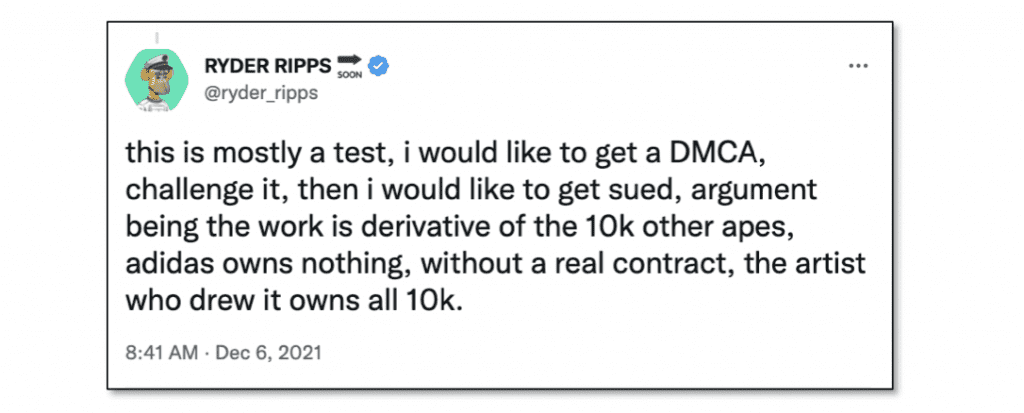Yuga Labs is angling to get the counterclaims that artist Ryder Ripps and Jeremy Cahen have waged against it tossed out in the latest round of the parties’ trademark clash. On the heels of Ripps and Cahen lodging claims of their own last month, the company behind the Bored Ape Yacht Club NFTs argues in a newly filed motion to strike and dismiss that by way of “bogus counterclaims,” the defendants are looking to “litigate defenses to hypothetical claims that [it] has not brought and to rewrite history by painting themselves as victims allegedly suffering ‘severe emotional distress’ because [it] defended its trademarks in court and itself against [their] relentless attacks.”
In the January 16 motion to strike and dismiss, Yuga Labs argues that Ryder Ripps and Cahen (the “defendants”) – who are behind the collection of “satirical commentary”-centric RR/BAYC NFTs that allegedly infringe Yuga’s trademarks – fall short in making their claims and thus, their knowing misrepresentation of infringing activity, declaratory judgment, intentional – and negligent – infliction of emotional distress claims should be dismissed or stricken in their entirely …
Emotional Distress – Primarily, Yuga Labs asserts that the defendants’ claims for “emotional distress” fail because “they are based on alleged conduct that comes nowhere near the ‘extreme and outrageous’ standard required” and because “the defendants’ own allegations and public statements establish that they have not suffered any injury as a result of Yuga Labs defending itself – let alone the ‘extreme emotional distress’ required to sustain such claims.”
To the extent the court “believes more information is necessary to determine if the defendants actually suffered severe emotional distress,” Yuga Labs asserts that the court “should consider Defendants’ own public statements and actions to the contrary,” and points the following December 2021 tweet from Ripps …

Among other tweets, all of which “lack any indicia of emotional distress, much less severe emotional distress,” Yuga Labs states that on November 10, 2022, “Cahen tweeted that he is ‘perfectly ok[ay]’ with being known for the attack campaign against Yuga Labs.”
Defamation Declaratory Judgment – Moving on to the defendants’ declaratory judgment of no defamation claim (which is particularly interesting given that Yuga Labs does not accuse Ripps and Cahen of defamation in the suit), counsel for Yuga Labs asserts that the court should reject this claim “because it presents no ‘case or controversy’ to invoke this court’s subject matter jurisdiction” – precisely because Yuga Labs does not make a defamation claim. In other words, Yuga Labs maintains that in seeking a judgment from the court, Ripps and Cahen are looking to get the court to a “grant them immunity from a hypothetical defamation claim” stemming from “thousands of prior public statements [they made] about Yuga Labs or its founders.”
Anti-SLAPP – Reflecting on the emotional distress and defamation declaratory judgment claims, Yuga Labs also argues that these claims center on conduct that “falls squarely within” California’s anti-SLAPP statute and for which the defendants “cannot show a ‘probability of success’ (or any chance of success),” and thus, the court should strike them.
Knowing Misrepresentation of Infringing Activity & Declaratory Judgment of No Copyright – The defendants’ copyright-focused claims similarly fail, according to Yuga, because the court lacks subject matter jurisdiction over them. Specifically, the BAYC-maker contends that Ripps and Cahen “have not been harmed by any copyright takedown” that it filed with NFT marketplaces in connection with their RR/BAYC project. In terms of the defendants’ defamation declaratory judgment claims, Yuga Labs argues that they should be dismissed for lack of subject matter jurisdiction since it does not have copyright registrations for the BAYC images, and thus, cannot sue for infringement. (Having to possess a copyright registration in order to sue for infringement was the practical takeaway of the Fourth Estate case.)
Mirroring its argument against the defendants’ bid for a defamation declaratory judgment, Yuga Labs further argues that the copyright declaratory judgment claims should also be tossed out since the defendants “know and publicly admit that Yuga Labs has never brought copyright claims against them,” including in this case. As such, Yuga Labs contends that “there is no case or controversy as to hypothetical copyright infringement.”
With the foregoing in mind, Yuga Labs argues that the defendants “have brought a series of legally deficient and retaliatory counterclaims purely to gain a tactical litigation advantage unrelated to the trademark dispute before the court.” This is “wholly inappropriate,” according to Yuga, which requests that the court strike the defendants’ state-law counterclaims under California’s anti-SLAPP statute – or in the alternative dismiss them, as well as dismiss the federal-law counterclaims.
Yuga Labs’s filing comes on the heels of Ripps and Cahen’s filing counterclaims late last month, doubling-down on their overarching argument that Yuga Labs’s lawsuit is part of an “attempt to silence creators who used their craft to call out a multi-billion-dollar company built on racist and neo-Nazi dog whistles” – and to introduce some new elements in the case, namely, copyright and defamation.
The case is Yuga Labs, Inc. v. Ryder Ripps, et al., 2:22-cv-04355 (C.D. Cal.).











